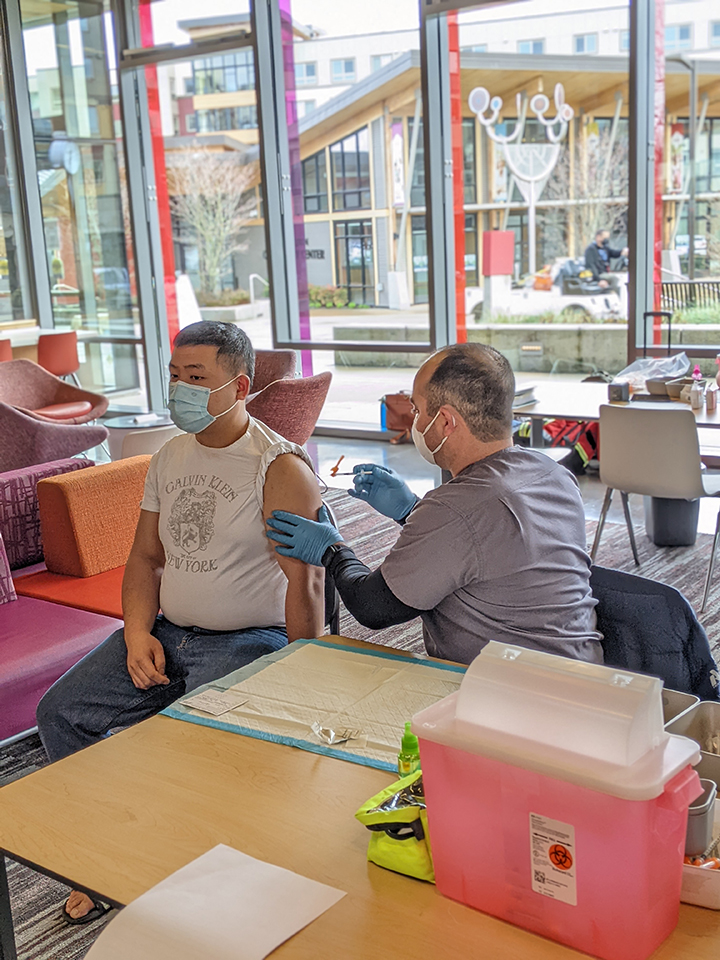While the national and public health states of emergency have become a thing of the past, as of May 11, 2023, COVID-19 is still spreading in our communities and continues to mutate and evolve over time. People are still regularly being hospitalized and even dying because of COVID-19, especially among those who are older and have underlying conditions.
Public Health–Seattle & King County said it is important to continue practicing public health measures, such as getting vaccinated in addition to wearing masks and practicing social distancing, especially as people prepare for summer gatherings and travel.
Dr. Eric Chow, Chief of Communicable Disease Epidemiology and Immunization within the Prevention Division for Public Health–Seattle & King, said, “While we are now in a very different place in the COVID-19 pandemic with the availability of effective COVID-19 vaccines and other treatments, ensuring access to these interventions is critical. We’re continuing our work with federal and state policy makers to emphasize the importance of supporting low-barrier access to these live-saving interventions, particularly for people who don’t have insurance coverage.”
The latest development in the fight against COVID-19 is the recommendation for an updated (bivalent) vaccine for everyone aged 6 months and older. This updated vaccine targets the Omicron variants that are currently circulating in our communities, as well as the original strain of the COVID-19 virus. Getting the updated vaccine and staying up-to-date with all recommended vaccine doses is the best way to protect yourself and those around you from severe COVID-19.
The Centers for Disease Control and Prevention (CDC) now recommend that everyone aged 6 years and older should get one updated Pfizer or Moderna COVID-19 vaccine to be considered up-to-date. Children aged 6 months to 5 years may need multiple doses of COVID-19 vaccine to be up-to-date, depending on the number of doses they’ve previously received and their age. If you have questions about how many doses you need, it is best to check with your healthcare provider.
In addition to the primary series, some people may need additional COVID-19 boosters. People aged 65 years and older may get one additional updated COVID-19 booster dose four or more months after the first updated COVID-19 vaccine. People who are moderately or severely immunocompromised may get one additional updated COVID-19 booster dose two or more months after the first updated COVID-19 vaccine.
The updated Moderna and Pfizer boosters, also called “bivalent” boosters, use the same ingredients as other COVID-19 vaccines, with a change to one of the proteins to target Omicron variants. You should get the updated booster if you completed your primary series and it has been at least two months since your last primary vaccine or booster dose. You can choose the Moderna or Pfizer updated booster, and you do not need to get the same brand as your primary series or last booster (unless you are under 5 years old).
Getting the updated booster is important because it is designed to protect us from the Omicron variant, which is currently the most common form of the virus spreading. The updated booster helps to protect against both the original strain and the Omicron strain of the virus, which can help to prevent serious illness and death, especially for adults over age 50. Vaccination can also lower the risk for long COVID, which can lead to serious long-term health problems.
Getting the updated booster is easy and convenient. Public Health–Seattle & King County has drop-ins and appointments for the whole family at their vaccine clinic in the Auburn Outlet Mall, Fridays through Mondays, 10:30 am–7 pm. There is more information about this site, pop-up events, and vaccination options in cities throughout King County on kingcounty.gov/vaccine or you can ask about boosters at a local pharmacy near you.
Updated boosters are free, and no insurance or proof of citizenship is required. If you need language interpretation or disability accommodation, email PublicHealthAccommodations@kingcounty.gov or call 206-477-3977.
This health series is made possible by funding from the Public Health–Seattle & King County, which has no editorial input or oversight of this content.




